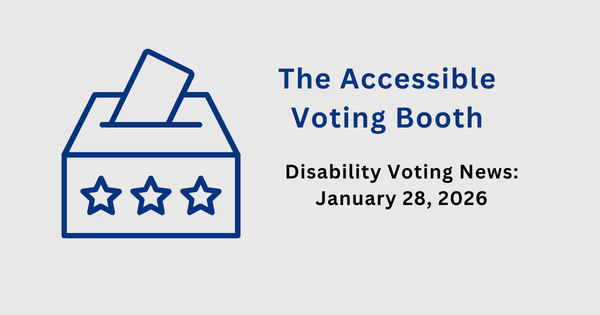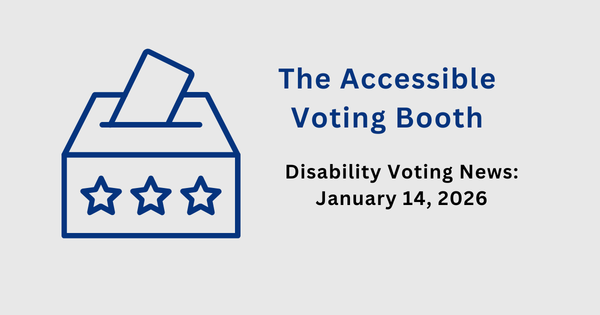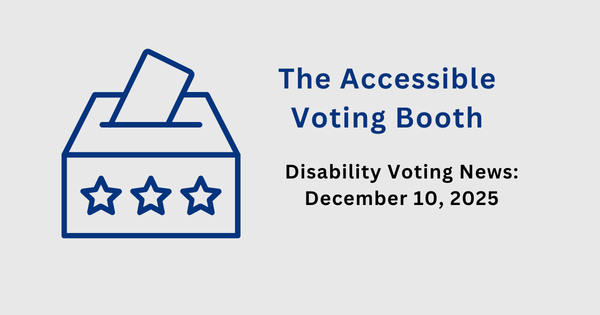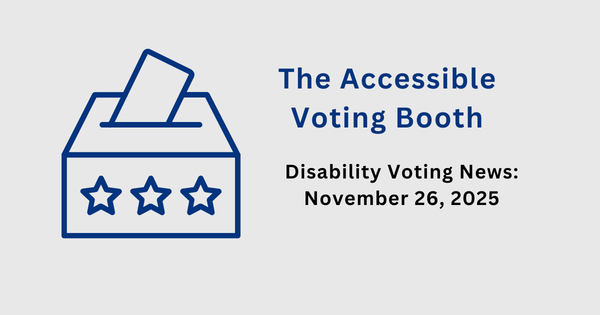Disability Voting News: August 6, 2025
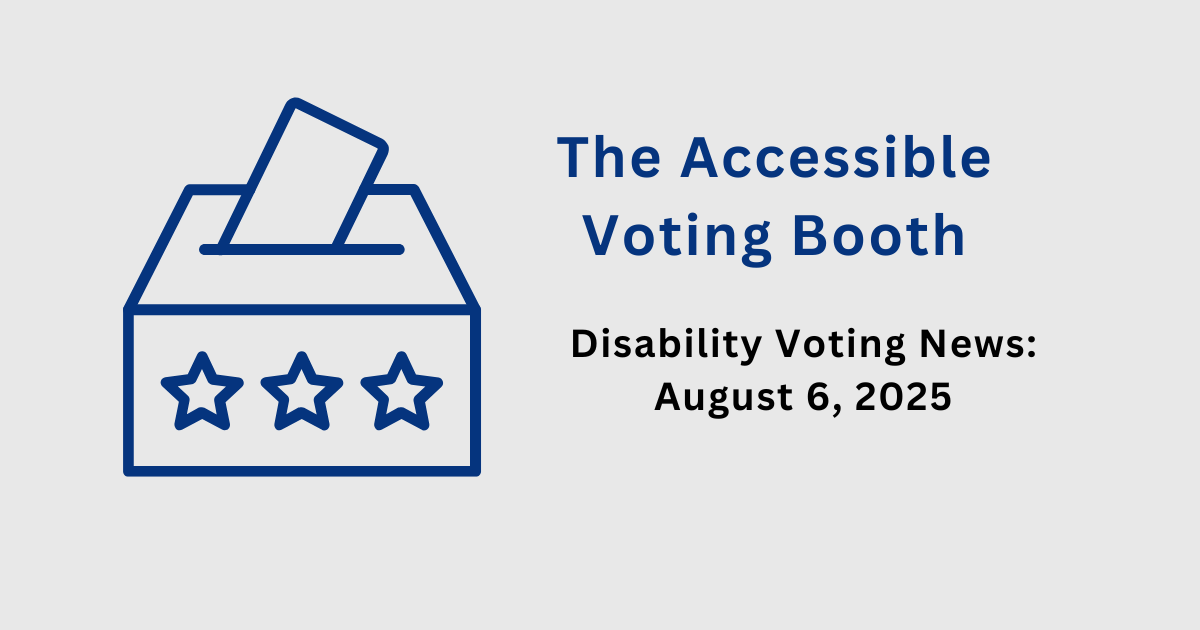
Welcome to the first Accessible Voting Booth of August 2025! Today, we have a number of updates out of New Hampshire, the reintroduction of the John Lewis Voting Rights Advancement Act (VRAA), and an op-ed on a concerning citizens initiative on the ballot this year in Maine.
New Hampshire makes accessible voting system pilot permanent, governor vetoes legislation that would take away accessible voting systems in local elections (via Voting Rights Lab).
Let’s start with two pieces of great news out of New Hampshire. First, Governor Kelly Ayotte signed H67 into law, which permanently requires the secretary of state to provide accessible voting systems to political subdivisions for use in nonfederal elections. Previously, this was only required as part of a six-month pilot program. This is fantastic news, because as we’ve shared many times in this newsletter, the Help America Vote Act’s requirement for accessible voting equipment only applies to federal elections, and so it is up to the states to ensure that local and state elections are fully accessible. This news is made even better by the fact that Governor Ayotte vetoed HB613, which would have undermined this entire program and the right to vote privately and independently in nonfederal elections.
I covered this legislation at length in the June 18th issue:
“HB 613 would create an exemption wherein jurisdictions could post a notice on their website informing voters that there will not be accessible voting equipment in a local election unless a voter informs the clerk in writing at least two months before Election Day that they need to use accessible voting equipment.
This is a ridiculous exemption that would put the burden on disabled voters to ensure that polling places are accessible, as they would have to not only be aware that they need to request accessible voting equipment before a local election, but they would have to inform the local clerk in writing at least two months before that election that they need accessible voting equipment. Every polling place should have accessible election equipment for every election. Disabled voters shouldn’t have to go out of their way to inform clerks that they need voting to be accessible to them. James Ziegra, senior staff attorney at Disability Rights Center of New Hampshire calls HB 613 unconstitutional and says ‘it gives an out to towns that don’t want to provide disabled residents the means to vote accessibly.’”
This means that in New Hampshire, voters will have consistent access to accessible voting equipment in both federal and non-federal elections.
New Hampshire expands proof of citizenship to mail voters and requires photo ID to register to vote by mail (via the Markup).
Unfortunately, we’ve also got bad news out of New Hampshire, which enacted SB 218 to require individuals registering by mail to vote to include proof of identity, citizenship, residence, and age. Previously, New Hampshire required documentary proof of citizenship to register in person, but not by mail (New Hampshire doesn’t have online voter registration, and most voters register in person). As we’ve established in previous issues of The Accessible Voting Booth, requiring documentary proof of citizenship creates significant barriers for many voters, including voters with disabilities. From my April 2nd issue:
“Obtaining the required proof of citizenship may be inaccessible to voters with disabilities. It is costly, requires navigating complicated bureaucratic processes, and takes time. We know that these barriers already impact disabled voters' ability to obtain voter ID: a study by the Center for Democracy and Civic Engagement found that “20% of people who have self-identified as having a disability do not have a driver’s license, while an additional 9% have a license without their current name or address, as compared to 6% of nondisabled people who do not have a license and an additional 13% who have a license but without their current name or address.” I cannot find data on how many disabled people have access to passports or updated birth certificates, but we must consider that disabled people may experience administrative hurdles to accessing these documents, such as inaccessible processes for obtaining passports or birth certificates. Additionally, as the poverty rate for adults with disabilities is 27% as compared to 12% for adults without disabilities, disabled people may be less likely to have a passport due to the cost of travel, and they may have a harder time affording the $130 passport fee. “
Keep those statistics on access to driver’s licenses in mind when we talk about SB 287, the other legislation recently enacted in New Hampshire. This legislation requires voters who want to vote by mail to provide a copy of photo ID with their ballot application, present photo ID in person to the election clerk, or include a notarized signature on their application form.
Voters who want to vote by mail due to disability or an inability to get to the polling place are more likely to have difficulty obtaining a photo ID, as they may also experience barriers to getting to an appointment to obtain that photo ID or to get a notarized signature on their application. They may have a more challenging time accessing transportation to get to an ID or notarization appointment and may experience access barriers at the buildings where they have to go to get these appointments, as well as financial barriers to obtaining ID or notarized signatures.
Both pieces of legislation were signed into law by Governor Ayotte on Friday, August 1st.
Senators Durbin and Warnock reintroduce John Lewis Voting Rights Advancement Act (via Legal Defense Fund).
On Tuesday, July 29th, Senator Dick Durbin and Senator Raphael Warnock reintroduced the John Lewis Voting Rights Advancement Act (VRAA) in the U.S. Senate.
The VRAA is a wide-ranging piece of legislation aimed at addressing several systematic, discriminatory voting practices in the United States. In particular, this means reinstating federal preclearance provisions, which would require jurisdictions that have a history of voter suppression to receive prior approval before implementing electoral changes.
Since the Voting Rights Act was gutted in Shelby v. Holder, eliminating that preclearance requirement, states have been able to implement a variety of voter suppression measures that particularly target racially marginalized voters, from documentary proof of citizenship and restrictive voter ID laws, to discriminatory voting maps, to voter roll purges.
This legislation is critically important for voting equity in our country, including for disabled voters. The Voting Rights Act explicitly addresses disability, and as we saw last week, the Eighth Circuit Court ruled that disabled voters and organizations representing them can no longer sue for disability-related violations of the VRA. But beyond that, it’s vital for us to support the VRAA because it addresses this country’s long history of racialized voter suppression, an issue that impacts both disabled and nondisabled voters of color.
I’ve worked in disability advocacy spaces for a decade now, and unfortunately, white-led disability advocacy spaces have often fallen short when it comes to supporting racially marginalized disabled people and the legislation that impacts them. Well…”falling short” is a generous term, as these spaces have been home to everything from daily racist microaggressions to overt bigotry that has drained and driven disabled people of color out of movement spaces. At times, some people in the disability advocacy space have even tried to undermine civil rights advocacy and legislation when they perceived it as “not doing a good enough job to address disability.” This is a manifestation of how white supremacy is still pervasive in the disability rights movement, and something we need to address and dismantle.
The disability advocacy movement needs to loudly support the VRAA and to be allies and co-conspirators to the Civil Rights movement that has been working for decades to right the wrongs of this country’s discriminatory voting system.
Disabled Mainer sounds alarm on citizens initiative that would disenfranchise marginalized voters (via Bangor Daily News).
On August 4, Maine resident Noah T. Carver wrote an opinion piece in the Bangor Daily News about a citizens initiative that will be on the ballot in the November election that includes 25 provisions that will particularly impact marginalized voters, including a voter ID requirement, requirement for disabled and elderly Mainers to request absentee ballots before each election, shortening of the absentee voting period, disallowing voters to request absentee ballots by phone, limitations on drop boxes, and more. This citizens initiative has been put forward on the basis of curbing voter fraud, even though Maine officials have affirmed that voter fraud in Maine is rare, with only two cases after the 2020 election and one dismissal of charges after another voter completed community service and wrote an apology letter.
Carver, a voter with blindness, explains the barriers he experiences in obtaining voter ID:
“I live on Beals Island. The nearest Bureau of Motor Vehicles branch office where one can obtain a state identification card is in Ellsworth, a three-hour round-trip journey. As Maine BMV offices are not open during weekends and I cannot drive due to my Blindness, I must take time off from work and also hire a driver or rely on friends or family who must do the same. Given that Maine is a rural state, this will be the experience of many disabled Mainers who cannot legally drive if they need to obtain an ID in order to vote.
The same will hold true for those who typically request an absentee ballot by phone, which would be banned under the referendum. These voters would need to take time off to request their ballot in-person during town office hours, which are often limited in small towns like ours. This effectively amounts to a poll tax which will undoubtedly deny access to many.”
Carver calls on Mainers to reject the citizens initiative, which he describes as “[solving] a nonexistent problem by making it difficult if not impossible for Mainers to perform their civic duty.” Read the full op-ed at Bangor Daily News.
Thank you for reading this week’s edition of The Accessible Voting Booth! As always, if you’d like to support the newsletter and my work, here’s how:
- Subscribe to the Accessible Voting Booth newsletter.
- Share this newsletter with your network to spread the word about disability voting rights.
- Leave me a tip. Thank you for supporting my work!

